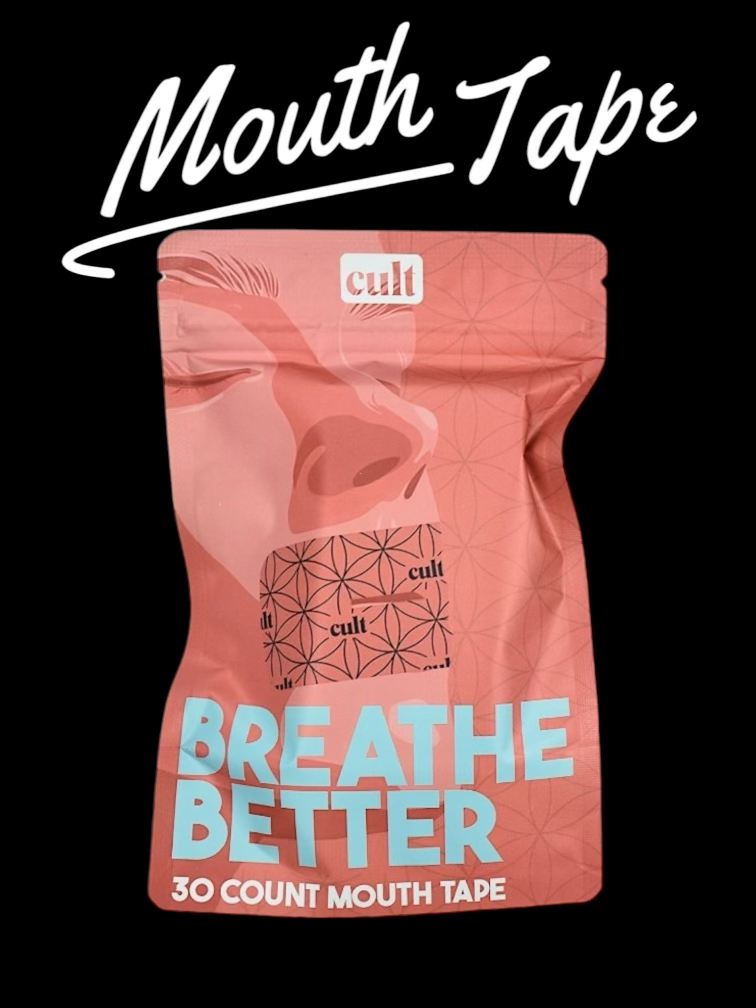
Is Mouth Taping Safe? What You Need to Know Before You Try It
Share
Mouth taping has become a hot topic in the world of sleep improvement, with people using it to reduce snoring, prevent dry mouth, and improve sleep quality. But with any trend that grows quickly, one question inevitably follows: Is mouth taping safe?
If you’ve been curious about this growing wellness trend but are concerned about whether it’s safe to tape your mouth shut at night, you’re not alone. In this article, we’ll take a close look at the safety of mouth taping, how it works, who can benefit from it, and any potential risks involved. This will help you make an informed decision on whether or not mouth taping is right for you.
How Does Mouth Taping Work?
Mouth taping is a simple technique used to encourage nasal breathing during sleep. By placing a small strip of tape over your lips, you prevent your mouth from opening at night, forcing you to breathe through your nose.
Nasal breathing has several health benefits over mouth breathing, including:
- Better oxygen absorption: Nasal breathing allows your lungs to take in more oxygen.
- Air filtration: The nose filters and humidifies the air, reducing the risk of respiratory issues.
- Improved sleep quality: Nasal breathing supports deeper, more restorative sleep.
However, many people breathe through their mouths while sleeping, which can lead to snoring, dry mouth, and fragmented sleep. Mouth taping is designed to correct this by retraining your body to breathe through your nose.
Follow Us on TikTok
@jointhecultco Mouth taping carries risk. Heres whay you need to know The tape i use is @BreatheBetter CULT #mouthtapingforsleep #mouthtaping ♬ original sound - Breathe Better CULT
Is Mouth Taping Safe? The Short Answer
For most people, mouth taping is safe when done correctly. However, like any health technique, there are important factors to consider before giving it a try. While many users report improved sleep quality and reduced snoring, there are some who may experience discomfort or complications if not careful.
Let’s break down the main safety concerns and how you can safely incorporate mouth taping into your nightly routine.
Safety Concerns to Be Aware Of
Before jumping into mouth taping, it’s important to consider a few key safety concerns:
1. Nasal Blockages or Congestion
Mouth taping works best when your nasal passages are clear. If you suffer from nasal congestion due to allergies, colds, or a deviated septum, forcing yourself to breathe through your nose may be uncomfortable and unsafe. In these cases, mouth taping could restrict airflow and make breathing difficult.
Solution: Make sure your nasal passages are clear before using mouth tape. If you frequently suffer from nasal blockages, consult with a doctor to determine whether mouth taping is suitable for you.
2. Sleep Apnea
For people with sleep apnea, mouth taping might pose risks. Sleep apnea is a condition where breathing repeatedly stops and starts during sleep due to airway blockages. Mouth taping could worsen the condition if it forces the body to rely solely on nasal breathing, potentially increasing the frequency of apnea episodes.
Solution: If you have sleep apnea, consult with a healthcare professional before trying mouth taping. For some individuals with mild sleep apnea, it may be helpful, but for others, it can complicate the condition.
3. Skin Irritation
If you use the wrong type of tape, you might experience skin irritation around the lips. Regular household tapes or overly adhesive materials can cause discomfort or even damage the delicate skin around the mouth.
Solution: Always use a gentle, medical-grade tape designed for skin contact. Specialized products, like Breathe Better Mouth Tape from Cult, are made specifically for this purpose and are far more comfortable and safer for long-term use.
4. Anxiety or Discomfort
For some people, the sensation of having their mouth taped shut can cause feelings of anxiety or claustrophobia. This may disrupt sleep or make it difficult to relax, especially if you’re new to the practice.
Solution: Start slowly. If you’re nervous about mouth taping, try using the tape for short naps or during the day while awake. This will help you get used to the feeling and reduce any potential anxiety when you try it at night.
How to Safely Use Mouth Tape
If you decide to give mouth taping a try, here are some tips to ensure you’re doing it safely:
-
Use the right tape: Avoid using regular adhesive tape, which can be too strong and irritating. Instead, opt for medical-grade tape or strips specifically designed for mouth taping, such as Breathe Better Mouth Tape from Cult.
-
Don’t cover your entire mouth: You don’t need to seal your lips entirely. A small strip of tape across the center of your lips is usually enough to keep your mouth closed while still allowing you to open it if needed.
-
Test it out first: If you’re new to mouth taping, start by using it for short periods while you’re awake or during a nap. This can help you get used to the sensation before using it for a full night’s sleep.
-
Check with a doctor: If you have any existing breathing issues, like sleep apnea, or frequent nasal congestion, consult with a healthcare professional before trying mouth taping. They can help you determine whether it’s a good fit for your situation.
Who Should Avoid Mouth Taping?
While mouth taping is generally safe for many people, there are some who should avoid it:
-
Chronic nasal congestion: If you consistently struggle with nasal blockages due to allergies or a deviated septum, mouth taping might restrict airflow and lead to breathing difficulties.
-
Moderate to severe sleep apnea: If you have sleep apnea, particularly more severe cases, mouth taping can interfere with treatment and make it harder to get enough oxygen while you sleep.
-
Anxiety or claustrophobia: Those with anxiety related to breathing or a fear of confined spaces might find mouth taping too uncomfortable to use.
The Benefits of Mouth Taping When Done Safely
When used safely, mouth taping can have several important benefits for sleep and overall health:
1. Improved Sleep Quality
Nasal breathing allows your body to take in more oxygen, leading to deeper, more restful sleep. Many people who use mouth tape report feeling more refreshed and alert when they wake up.
2. Reduced Snoring
Mouth breathing is a common cause of snoring. By taping your mouth closed, you encourage nasal breathing, which reduces snoring and leads to quieter nights.
3. Healthier Mouth and Gums
Mouth breathing dries out your mouth, which can lead to gum disease, bad breath, and other oral health problems. Mouth taping helps keep your mouth moist and promotes better oral health.
Conclusion: Is Mouth Taping Safe for You?
So, is mouth taping safe? For most people, the answer is yes—as long as it’s done correctly. Mouth taping can be a simple and effective way to improve your sleep quality, reduce snoring, and promote healthier breathing habits. However, if you have underlying health conditions like sleep apnea or frequent nasal congestion, it’s essential to consult with a healthcare professional before trying mouth tape.
By following safety guidelines and using the right materials, mouth taping can be a safe, non-invasive solution to help you get a better night’s sleep. Ready to give it a try? Join the Cult :)

